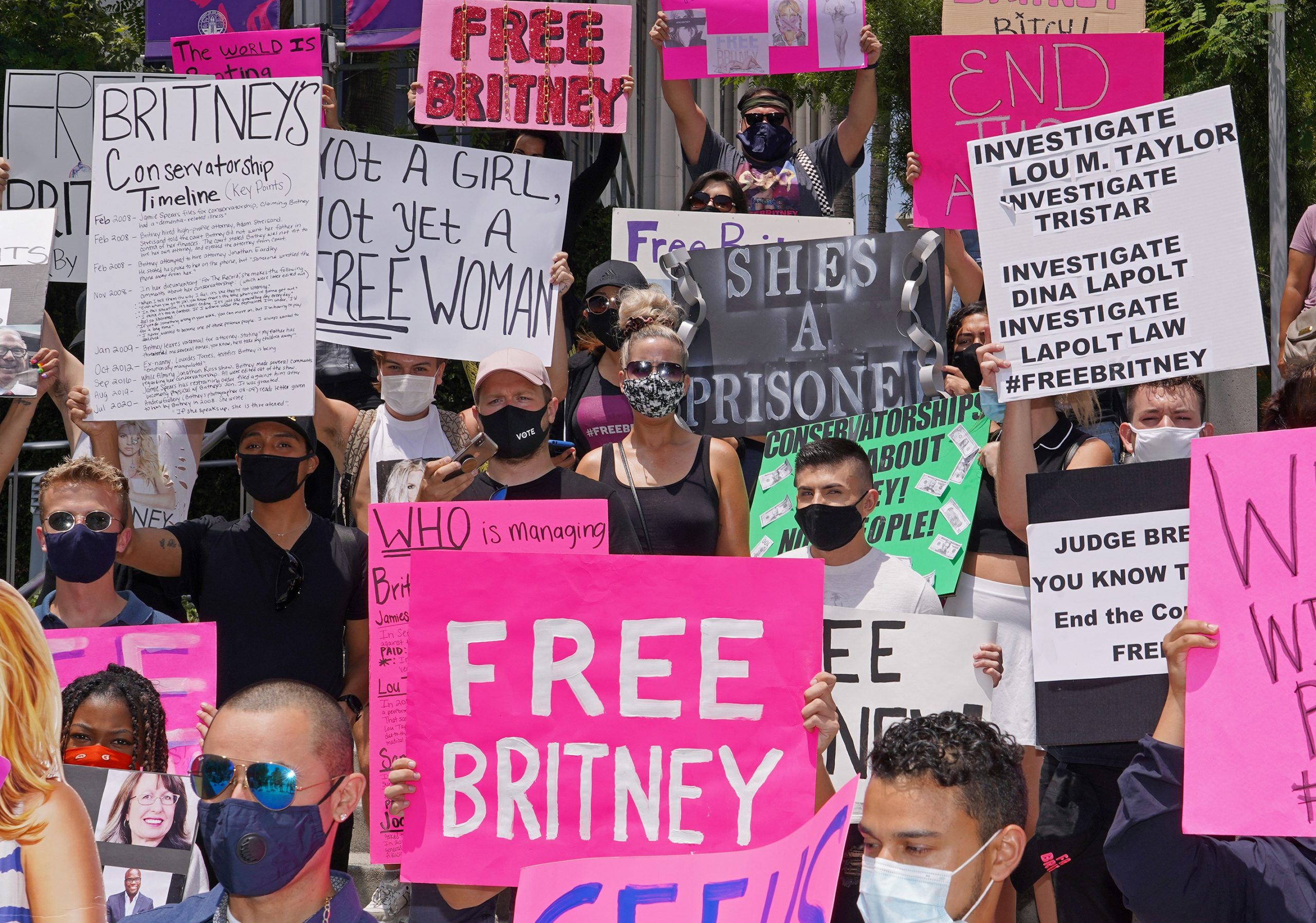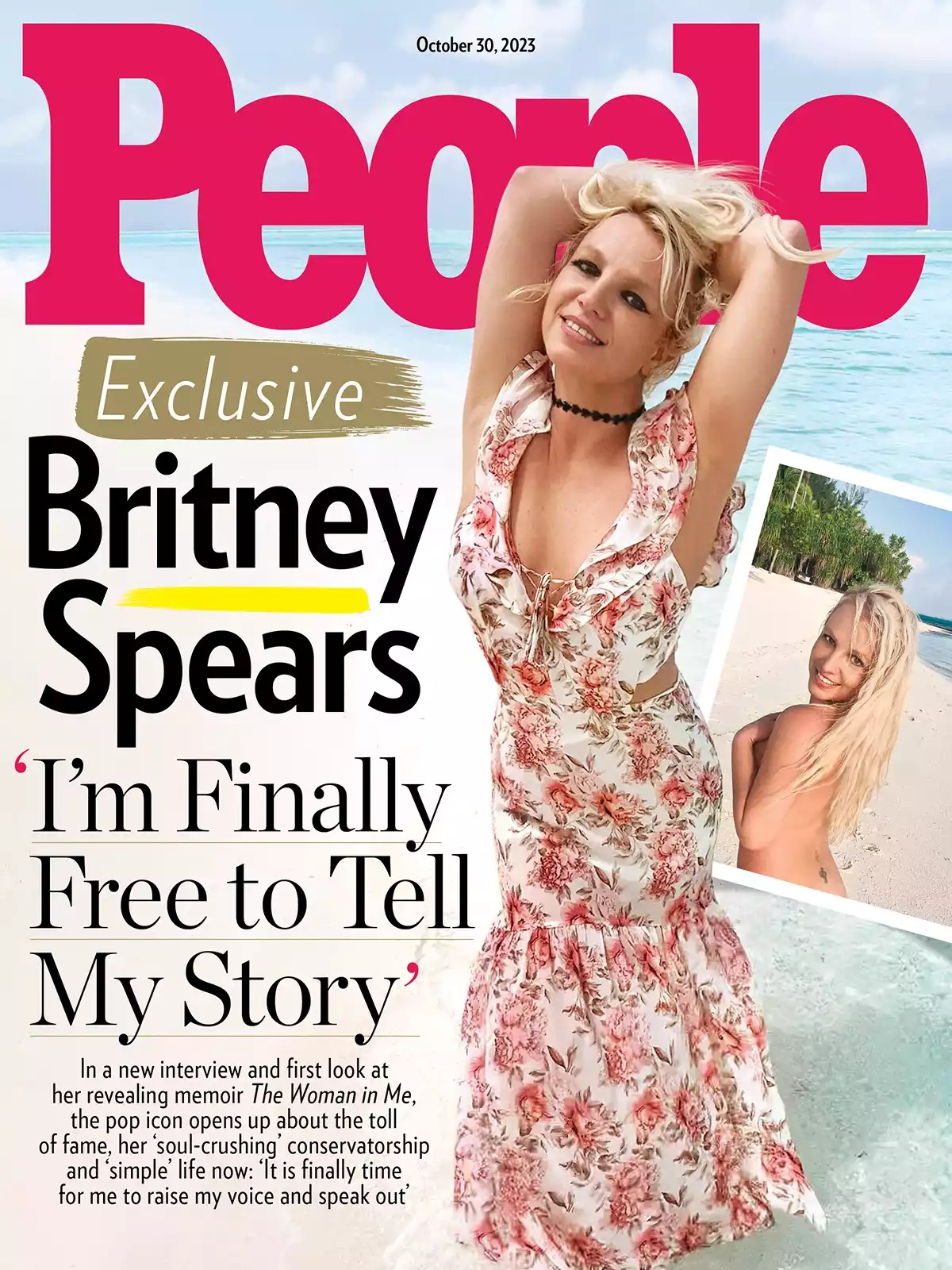Illustration by team illustrator Sakura Siegel.
Warning: Spoilers of “The Woman in Me” are mentioned in this article.
June 21, 2021 is a day I still remember clearly.
Britney Jean Spears, the Princess of Pop, testified in a public court session that was audio streamed for the media and public about the horrific abuses and financial misconduct she experienced under a 13-year conservatorship managed by her father, James “Jamie” Spears, and Lou M. Taylor, CEO of Tri Star Sports and Entertainment Group.
A colleague found a link to listen to the stream and I immediately clicked on it, listening to her 24-minute statement. Tears welled in my eyes when she said, “I wish I could stay with you on the phone forever, because when I get off the phone with you, all of a sudden all I hear are these nos.”
As a fan, I was proud of her and I knew the world was listening.
On Nov. 12, Judge Brenda Penny formally terminated the conservatorship. Finally, the nightmare of 13 years was over.
Britney Spears is the Millennial generation’s Marilyn Monroe, but survived as the Final Girl in her turbulent life that could be compared to a psychological horror movie.
And now she is stronger than yesterday. Now it’s nothing in her way.
That was a lyrical reference to Britney’s 2000 hit “Stronger” from her second studio album “Oops!… I Did It Again,” by the way.
It’s been a couple years since she regained freedom and the Princess of Pop has released her anticipated memoir, “The Woman in Me” on Oct. 24. The title derives from a lyric from her 2002 single “I’m Not A Girl, Not Yet a Woman,” and the book recounts her childhood, her journey to tumultuous stardom, her past romantic relationships and marriage, her very public breakdown in 2007, her conservatorship and–finally–its termination.
As of Nov. 9, according to AP News, the book has remained the country’s top-selling book in its second week of publication. The singer’s memoir sold just over 132,000 copies last week, according to Circana, which tracks around 85% of hardcover and paperback sales. The week before, it sold more than 400,000 physical copies. On Amazon, “The Woman in Me” was the No. 1 book on its list of most read and sold non-fiction titles before Matthew Perry’s memoir “Friends, Lovers, and the Big Terrible Thing” overtook the spot following his tragic death on Oct. 28.
Britney’s Influence In Pop Culture And Media
If you grew up in the late 90s and early-to-mid 2000s, you could not avoid hearing about the music, gossip and tabloid news about Britney Spears.
She is credited for influencing the revival of teen pop with her debut 1999 album “…Baby One More Time,” and she has sold over 150 million records worldwide, making her one of the world’s best-selling music artists.
Despite her immense fame, she was the subject of very intense scrutiny and backlash by the press and the public for accusations of being overtly sexual and or being a bad influence to the youth. Their morbid fascination with her or a potential downfall culminated in her personal problems being highly publicized.
The years of 2006 and 2008 were when the paparazzi and press was its most intense chasing and photographing after Britney almost anywhere she went–even when she was out independently or with her sons, friends or acquaintances.

In addition, she was going through a very public divorce with her ex-husband Kevin Federline, alongside an equally public custody battle. There were also accusations she had a drug addiction, alcoholism or both, although she claimed she “liked to drink but it was never out of control,” “never had any interest in hard drugs” and that her only drug of choice was Adderall because it was the only thing that worked as an antidepressant.
Her public breakdown in 2007 filmed and photographed by paparazzi, which especially included incidents of her shaving her entire head bald and angrily attacking a paparazzi’s car with an umbrella, consequently led her to be involuntarily placed in a conservatorship by her father and Taylor. “The Woman in Me” implied Taylor was the mastermind in convincing James Spears to petition Britney to be placed in a conservatorship.
My millennial cousin, Xytuz Maralit, who lives in Trenton, New Jersey, has clear memories of being a huge fan of Britney. I knew she was very famous back, then but talking to my cousin about Britney confirmed how iconic she was internationally.
“When I was younger, in the Philippines, my cousins and I would go to Lipa City malls and participate in singing Britney Spears song competitions,” she recalled.
How famous she is even in my family’s motherland is mentioned in these particular lyrics of her 2007 song “Piece of Me”:
I’m Miss American Dream since I was seventeen
Don’t matter if I step on the scene
Or sneak away to the Philippines
They still gon’ put pictures of my derriere in the magazine
I was born in 1999, so I was too young to remember the greatest height and years of her music career, but I do recall my 8-year-old self seeing front covers of magazines and newspapers near cash registers, depicting paparazzi photos of her shaved head.
I vaguely remember an adult relative briefly making comments that Britney was “going crazy.”
It wasn’t until college years when I listened to her entire albums, becoming a fan and truly recognizing her as a pop icon. But I still grew up listening to Britney’s singles on the radio, MP3 players and through YouTube as a kid. I especially loved “…Baby One More Time,” mesmerized by her beauty and dance moves in its music video.
Although they were released during her conservatorship, “3” and “Circus” were also some of my childhood favorites too. In an eighth grade dance party, I even have vivid memories of me and my classmates dancing and singing her collaboration with Will.i.am “Scream & Shout,” although I didn’t–and don’t know–anyone around my age who are Britney fans.
I was not aware she was in a conservatorship until 2020 when the #FreeBritney movement became louder than ever before. So the tabloids I saw displayed on magazine racks in the early 2010s about how Britney was “doing better” were all lies.
When “The Woman in Me” was announced, I excitedly preordered the book. Spears’ memoir is very raw and unfiltered, and the many stories she told made me feel overwhelmed with sadness, sympathy, anger (towards the many, many people who took advantage of her) and appreciation. Journalist Sam Lansky helped ghost write it, but as a fan who follows her Instagram, the book’s writing style does strongly resemble Britney’s voice – just proofread.
I had a laugh when Britney referenced her social media writing style in the end of the book’s acknowledgements, “If you follow me on Instagram, you thought this book was going to be written in emojis, didn’t you?” followed by six rose emojis. “The Woman In Me” may have been Project Rose after all!
However, the memoir felt as if there were still some missing holes such as her relationship with her ex-manager Sam Lufti, who was accused by the Spears family for being a bad influence to her in 2007 and 2008 that they implemented restraining orders against him. If some important figures were missing in the book, it may be to avoid potential lawsuits. Britney did hint about writing a volume 2 to release in the future in a now-deleted Instagram post, so we’ll see what more tea she would be spilling.
How The Conservatorship Was Placed
On Feb. 1, 2008, Britney Jean Spears lost her freedom for 18 years when Los Angeles County Superior Court Commissioner Reva Goetz placed her and her estate in a temporary conservatorship at the request of Jamie Spears. Overtime, it was extended to months and eventually made permanent.
A conservatorship is when a judge appoints another person to act or make decisions for the person incapable of caring for themselves and/or finances. The person the judge appoints is called the conservator. The person who needs the help is the conservatee. In this case, Britney was the conservatee.
Jamie Spears became the conservator of her person (or well-being) and also co-conservator alongside attorney Andrew M. Wallet of her estate.
Britney was not notified her father filed a petition to be placed in a conservatorship, and based on her memoir’s writings, it did not seem like she knew her father and Lou Taylor were conspiring to place her in one until it was too late. By California law, a proposed conservatee should be notified five days before the hearing about a temporary conservatorship.
On Jan. 31, one day before the conservatorship was placed, Spears was placed under 5150 involuntary psychiatric hold at the UCLA Medical Center. She recounts that day in her memoir that her mother persuaded her to come home, telling her the cops were after Britney. When she arrived, she described the scene as “a SWAT team of what seemed like twenty cops in my house” before she was taken away and treated as if she was a bank robber.
According to an archived ABC Report, her psychiatrist reported “she was in need of hospitalization,” while an archived People magazine article, stated a Spears family source said that Britney was prescribed medication, which she refuses to take.
Under California Welfare and Institutions Code (WIC) 5150, an individual can be involuntarily placed in a locked psychiatric facility for an evaluation for up to 72 hours if the individual is assessed to be a danger to themselves, a danger to others or “gravely disabled.” Any peace officer or specific individuals authorized by a county government may place the hold.
This was not the first time she was placed under 5150.
Weeks earlier on Jan. 3, authorities were also called to her home after she locked herself in a bathroom clinging to her 1-year-old Jayden James during a period she was granted visitation rights. Britney recalls, “The thought hit me: I may never see my boys again.” Apparently too, she was told that the security guard allowed her a bit of extra time.
“The only thing I was guilty of was feeling desperate to keep my children for a few more hours and to get some assurance that I wasn’t going to lose them for good,” she added. “I looked at my friend and just said, ‘But you said he would wait…’” She was strapped to a gurney to be taken to Cedars-Sinai Medical Center and evaluated under observation.
A culmination of those events, along with her public breakdown and the negative media frenzy, were used as justifications for why Britney should be placed in a conservatorship.
In California, a process of starting conservatorship begins when a person petitions for the court to appoint a conservator to a proposed conservatee. The court will examine factors such as the proposed conservatee’s finances, health condition and wishes to determine whether the person is incapacitated and needs a conservator.
Conservatorship laws can vary by state. In some states, they are used interchangeably with guardianship while others have different definitions. In California, a guardianship refers to the legal responsibility to care and manage the affairs of a minor child, while a conservatorship is appointed to care for the needs and estate of an incapacitated adult.
In New Jersey, a guardianship is court-appointed for an incapacitated adult person who is not able to make decisions or care for themselves. Meanwhile, a conservator is appointed for handling an adult individual who cannot manage their assets.
In New Jersey, both a guardianship and conservatorship are not necessary for one individual, rather it depends on the case.
It is important to note a New Jersey conservatorship is a voluntary process and less limited than a guardianship. The conservatee consents to allow the conservator to manage his or her assets. Unlike a guardianship, however, no determination of incapacity is required to establish a conservatorship. Instead, the court determines that the protected person’s decision-making ability is impaired to such a degree that they cannot properly manage financial matters.
In both New Jersey and California, the process of implementing conservatorships and/or guardianships begins when a person petitions to the court.
For Britney’s case, here in New Jersey, the local law would have recognized it as both a guardianship and a conservatorship.
However, in general, conservatorships and adult guardianships, are very serious matters and should be a last resort if the potential conservatee is either truly mentally incapacitated or incapable of managing their own financial affairs.
According Michelle Ferrer, Esq., M.B.A. a business and trust and estates attorney for the Ferrer Goldfine Law Group LLC based in Verona, New Jersey, whose practice also includes a full range of services related to Special Needs Planning and Guardianship, she told me that conservatorships and adult guardianships generally are implemented in elders and disabled young adults and that it “happens more often than you think.”
“It could happen because the person, let’s say a 17 year old, has special needs, [either] severe autism, cerebral palsy, or down syndrome. Someone who doesn’t have the capacity to make decisions on their behalf,” she said. “Sometimes mental illness can be a reason to not have capacity. Pretty severe mental health issues may require guardianships.”
However, Britney’s case was an extreme outlier.
Britney was declared by the judge that she was mentally incapacitated under the citation that she had dementia – which is bewildering. Dementia generally occurs in elderly individuals, but according to the Social Care Institute for Excellence, it is extremely rare for it to affect people as young as 30. Britney was 26 at the time her conservatorship was implemented.
She wrote in her memoir that she was “highly functional,” arguing against the accusation that she was incapacitated, “I’d just done the best album [Blackout] of my career,” she said. And in my opinion, she’s not wrong.
In 2007, she managed to somehow release what her fans considered her best discography during, at that time, the toughest period of her life.
How was a woman with dementia later able to release four more albums, go on four world tours, memorize complex choreographic dance moves and hold a residency hosting 146 concerts in Las Vegas for four straight years? Or guest star on two episodes of “How I Met Your Mother” a few weeks after the conservatorship was placed?

The Netflix documentary “Britney Vs Spears” revealed Dr. James Edward Spar, a retired geriatric doctor specializing in dementia, was a major driving force in Britney’s conservatorship placement. Producers of the documentary claimed to have sourced Dr. Spar’s medical report, which dated March 5, 2008, stated, “Britney Jean Spears lacks the capacity to retain and direct counsel. [She] lacks the capacity to understand or manage her own financial affairs without being subject to undue influence.” When questioned in the documentary, Spar refused to answer if he had examined Spears.
There were no other medical documents corroborating this claim that she had dementia.
Britney did reveal in her memoir that during the lowest period of her public image, she was experiencing both perinatal and postpartum depression from being pregnant for two years in 2005 and 2006. Yet, there are still many functional adults who have one or both conditions.
Having two babies in a short span of time can really take a toll on the parent’s body and psyche, and I’m very glad Britney addressed that there should be more awareness of mental health in mothers.
“Unfortunately, there wasn’t the same conversation about mental health back then that there is now,” she wrote. “I hope any new mothers reading this who are having a hard time will get help early.”
“Because I now know that I was displaying just about every symptom of perinatal depression: sadness, anxiety, fatigue.”
During the conservatorship process, Britney was not allowed to pick her own lawyer.
Ferrer said a court generally appoints an attorney of the alleged incapacitated person but there should be a serious assessment of their client and circumstance.
“An attorney is supposed to represent the rights of that alleged incapacitated person in a guardianship action,” she said.
“They have to do independent research, meet that person, interview the individuals wanting to seek guardianships and review medical records. You want to make sure this person doesn’t have capacity. If the person’s incapacitated and a guardian is appointed, the person loses rights to make decisions for themselves. So it’s a big deal.”
“We try to find the least restricted needs for them. Maybe just a limited guardianship, maybe just a guardianship of the estate,” she added, recounting her experiences working with New Jersey clients.
According to New Jersey Courts’ website, a limited guardianship is a less intrusive, more individualized, type of guardianship in which a guardian is appointed with authority as to some – but not all – areas. A limited guardianship is established based upon a court’s finding that the person alleged to be incapacitated lacks the capacity to do some, but not all, of the tasks necessary to care for himself or herself.
Upon discovering her father’s plan to place her in a conservatorship, Britney begged the court to literally appoint anyone else besides her father to be her conservator.
“And I mean, anyone off the street would have been better,” she said.
Her father was an alcoholic who had various failed businesses, could be aggressive on the rest of the Spears family and even was in rehab in 2004. She recalled this as “the same man who’d made me cry if I had to get in the car with him when I was a little girl because he talked to himself.”
“There were times when I needed my father over the years and I reached out, and he wasn’t there. But when it came time for him to be the conservator, of course he was on the case! He’s always been all about money,” she added.
Britney accused her father of enriching himself, raking in more than $6 million from her estate during her conservatorship. In addition to being paid $16,000 a month for his role as Britney’s conservator, Jamie also received a percentage of his daughter’s tour gross revenues. Jamie’s management company earned on average $484,000 each year during the 13-year conservatorship. Court documents argued the arrangement “allowed him to profit directly from Ms. Spears’s labor and incentivized him to maximize Ms. Spears’s output,” resulting in an exhausting schedule and forced “endeavors,” including her Las Vegas residency.”
Britney’s legal team also accused Jamie of using his daughter’s money and influence to leverage a career as a cook “by pitching a television show called ‘Cookin’ Cruzin’ & Chaos With James Spears.’” Her lawyer who helped terminate the conservatorship and former federal prosecutor, Matthew Rosengart, said Jamie “diverted personnel from Britney Spears’s tour to help him and retrofitted a tour bus from which he could travel, cook and serve food.”
There was also alleged financial mismanagement with Tri Star under a conflict of interest.
When Jamie Spears hired Tri Star to manage Britney’s business under the conservatorship, he owed a loan of $40,000. Britney claimed in her memoir, “At the time, [Taylor] had few real clients. She basically used my name and hard work to build her company.” Eventually over the years, Taylor garnered celebrity clients including Gwen Stefani, Priyanka Chopra and the Kardashians.
According to Charles J. Harder, Taylor’s lawyer, Tri Star would receive 5% of Ms. Spears’s “adjusted gross entertainment revenue.”
However, it is still unknown how much exactly they received from the estate, as the public versions of the court documents are heavily redacted and do not show how much money the company received from Britney’s estate.
In a New York Times article, it states two former senior Tri Star executives said the firm’s finances were kept under such tight wraps that they lacked access to basic information like the company’s balance sheets and income statements. Allegedly, one of the most secretive accounts belonged to Britney Spears.
The estate also paid for Black Box Security, which monitored her phone and according to a former Black Box employee Alex Vlasov, secretly recorded her in her bedroom. Screenshots of Spears’s text communications were shared with Robin Greenhill, the Tri Star executive. Britney mentions that Greenhill, along with her father, “ruled my life and monitored every move I made.”
According to internal Black Box documents, Black Box also kept tabs on #FreeBritney supporters who criticized Taylor and the conservatorship. The surveillance was billed to the estate.
According to Vulture, Sherine Ebadi, a forensic investigator with the Kroll firm and a former FBI special agent, investigated by interviewing Britney’s former music director, Marc Delcore, who worked closely with Britney on both the Circus tour and the Las Vegas residency. She claimed “based upon Kroll’s analysis of data made available by Tri Star via QuickBooks, Mr. Spears awarded Tri Star multimillion-dollar commissions and fees from his daughter’s earnings.”
After Britney stopped performing in 2019, Jamie granted Tri Star’s request to receive a $500,000 fee, as the company could no longer collect revenue from Britney’s performances per the original deal.
Under California judicial rules, “the conservator must avoid any personal, business or professional interest or relationship that is or reasonably could be perceived as being self-serving or adverse to the best interest of the conservatee.”
5033 Days
There was one moment in chapter 31 of “The Woman in Me” that emanates the atmosphere of a horror film, truly gripping the reader how dreadful Britney’s conservatorship would turn out to be and how she lost freedom:
At my house, my father took over my little study and my bar area and turned it into his office. There was a bowl there that had a bunch of receipts in it.
Yes, here’s my confession: I was so nerdy that I kept all my receipts in a bowl. Each week, I would add up my expenses old-school style to keep track of my deductions for taxes. Even when I was going through a wild spell, the fundamentals of who I was as a person was still there. To me, that bowl of receipts was proof that I was capable of managing my affairs.
I knew musicians who did heroin, got in fistfights, and threw TVs out of hotels. Not only didn’t I steal anything or hurt anyone or do hard drugs – I was keeping track of my tax deductions.
Not anymore. My father shoved aside my bowl of receipts, setting up his things on the bar. “I just want to let you know,” he said. “I call the shots. You sit right there in that chair and I’ll tell you what goes on.”
I looked at him with a growing sense of horror.
“I’m Britney Spears now,” he said.
Upon the conservatorship being set in place, Jamie Spears and his and Taylor’s team controlled every aspect of Britney’s life: her career, personal finances, exercise routine, diet, dating life and who she interacted with. She was overworked to exhaustion, even forced to perform when sick. She was not allowed to drive a car anymore. She was rarely allowed to go out on her own volition. When going to a party, a security team had to sweep around to make sure there were no alcohol, drugs or even prescription Tylenol.
If someone wanted to date her, he had to go through a background check, an NDA signing, a blood test — and being told of Britney’s entire sexual history. How humiliating!
There was an instance where her ex-fiancée Jason Trawick served briefly as co-conservator of the person from 2012 until 2013, but her father was the sole conservator of the person from 2008 until resignation in 2019 after violently assaulting his grandson and was replaced by care manager Jodi Pais Montgomery.
In her famous court hearing statement on June 23, 2021, she revealed to the world she had an intrauterine device (IUD) placed involuntarily in her uterus – yet her father would not let her have an appointment for it to be removed despite being forced to see doctors very regularly. She was also drugged with lithium – the same drug her paternal grandmother Emma Jean Spears was put on after being placed in asylum by her husband due to her overwhelming grief of the death of her three-day-old baby.
I lost count of the many times I read that she was confined to a hospital to be mentally evaluated out of suspicion she was abusing herself with drugs or alcohol. Or even taking over-the-counter energy supplements. But this explains the intergenerational trauma that runs in the Spears family.
“My father was thirteen when Jean died on that grave. I know that trauma is part of why my father was how he was with my siblings and me; why, for him, nothing was ever good enough,” she wrote in the beginning of the book.
I find it amazing how Britney, despite all the hardships, neglect, abuse, anger and pain she experienced in her childhood and adulthood from her family, still empathizes with them. She understands why they have become the people they are. What’s even sadder is she was once close to her siblings, her older brother Brian and her younger sister Jamie Lynn, but they are now estranged.
“I became a robot. But not just a robot – a sort of child-robot. I had been so infantilized that I was losing pieces of what made me feel like myself,” Britney wrote. “Anything that my father or my mother told me to do, I would reject. My pride as a woman wouldn’t let me take it seriously. The conservatorship stripped me of my womanhood, made me into a child. I became more of an entity than a person onstage. I had always felt music in my bones and my blood; they stole that from me.”
“My heart wasn’t in recording music anymore. I wasn’t passionately driven, like how I used to be. I had no more fire to bring. I was so over it.”
I don’t blame Britney if she ever quits performing and touring forever now that she’s free.
But the main reason that kept her going for 18 years of her living nightmare was her love for her children.
“Because I played by the rules, I was reunited with my boys,” she wrote. “It was an ecstatic experience getting to hold them again. When they fell asleep next to me that first night we had back together, I felt whole for the first time in months. I just stared at them sleeping and felt so, so lucky.”
“Glory” To Freedom
The conservatorship may have tried to break Britney, but her spirit still remained.
Britney became aware of the #FreeBritney movement from a friend who showed clips of concerned fans about her well-being and conservatorship and supporters marching on the streets chanting “Free Britney!”
During the COVID-19 pandemic in 2020, thanks to the boom of TikTok, the movement grew even more. A year later, the New York Times investigated and produced a documentary “Framing Britney Spears,” which garnered critical acclaim and provided the public more awareness of the conservatorship abuse.

According to Britney’s memoir, she said her court-appointed lawyer of over 13 years, Sam Ingham, “had never been much help, but during the pandemic, I started to wonder whether maybe I could use him to my advantage.” She began to speak to him twice a week to meditate on her options. In April 2021, Britney consulted with him to request a hearing to speak directly to the Los Angeles court.
Judge Brenda Penny set a June 23 date for the testimony.
The turning point was the night of June 22, 2021, when Britney called 911 to report her father for conservatorship abuse. The next day was her public hearing. And the rest is history as we know it.
Britney thanked her fans for standing up for her.
“I don’t think people knew how much the #FreeBritney movement meant to me, especially in the beginning,” she wrote. “And the fact that my friends and fans sensed what was happening and did all that for me, that’s a debt I can never repay.”
How Conservatorship And Guardianship Laws Could Be Improved
According to the Washington Post, numerous reports of people who have been abused under similar arrangements have emerged since the rise of the #FreeBritney movement.
There have also been discussions and concerns about other celebrities in conservatorships such as “Star Trek” actress Nichelle Nichols, who tragically passed away from heart failure on July 30, 2023, and singer Brian Wilson from The Beach Boys. A recent case of a celebrity conservatorship termination is of actress Amanda Bynes, which was removed as of March 22, 2022.
The American Bar Association (ABA), the American Civil Liberties Union (ACLU) and the National Council on Disability (NCD) have called for increased data and transparency about guardianship practices and better alternatives.
In March 2023, with the support of the ABA, Congress introduced the Guardianship Bill of Rights Act, which requires the Department of Health and Human Services (HHS) to establish a federal guidelines and a Guardianship and Other Protective Arrangements and Supported Decision Making Council to support the rights of older individuals and individuals with disabilities who are in guardianships, conservatorships or other protective arrangements.
The ABA also supports and urges a Court Improvement Program for the process of guardianship and for the Guardianship Bill of Rights, Elder Justice Act–which established the Elder Justice Coordinating Committee to coordinate activities related to elder abuse, neglect and exploitation across the federal government–or any other reform efforts.
For the proposed ward, the ACLU also suggests the alternative model of Supported Decision-Making, where people with disabilities keep their rights and their decision-making capacity. Instead of having a guardian make choices for them, people with disabilities should have supporters who help them make their own choices.
A person using supported decision-making appoints trusted advisors, such as friends, family or professionals, to serve as supporters. The supporters help the person with a disability understand, make and communicate their own choices.
A 2018 NCD “Beyond Guardianship” report shows there is a lack of data on existing guardianships and newly filed guardianships. They have found guardianship is often imposed when not warranted by facts or circumstances, because guardianship proceedings often operate under erroneous assumptions that people with disabilities lack capability to make autonomous decisions.
The report even alleged people with disabilities are often denied due to process rights in guardianship proceedings, that capacity determinations often lack sufficient scientific or evidentiary basis, and courts often lack adequate resources, technical infrastructure and training to monitor guardianships effectively and hold guardians accountable.
Ferrer emphasized to me that guardianships are still necessary but only if the case is very severe.
“The guardianship isn’t the issue, it’s the abuse of power given to you or granted to you by the court, whether you’re someone’s caretaker, guardian or conservator,” she said.
“What happened to Britney is very sad. I’m sure [cases similar] happen more than you think. Britney is a very public figure and a very extreme case. Individuals who are wards who have perhaps regained capacity who don’t even know potentially they could have their rights restored.”
Unlike in California where conservatorships can be permanent, guardianships are not intended to be permanent in New Jersey.
“There are more stringent rules for who is going to serve as guardian and what the requirements are. There has to be a yearly report of well being filed every year in New Jersey,” Ferrer added.
“So if you’re appointed a guardian of an individual, you have to file a yearly Report [of well-being] with the court on the anniversary of you being appointed. You have to tell the court how the ward is doing, any changes in their circumstances. If there’s a change of circumstances, perhaps it’s an opportunity to revisit and see if those allegedly incapacitated can have their rights restored.”
Alongside the Report of Well-Being, it also must be filed along with a Report of Guardian Cover Page.
Allegedly, Britney Spears was neglected being told until her famous June 23 court hearing that she had a right to terminate her conservatorship. To begin a process of ending a guardianship or a conservatorship, a petition must be filed to the court by the ward/conservatee, guardian/conservator, the spouse/domestic partner, a friend or an interested party.
“My Loneliness Ain’t Killing Me No More”
It’s very incredible how much Britney Spears has survived, thanks to her strength and the amazing efforts of the #FreeBritney movement. Even though it’s only been three years since she regained autonomy, she still is going through a long healing process.
You can’t undo 13 years of trauma, let alone long trauma from childhood. Some people still judge her for being “too weird” and “crazy” due to her Instagram posts of going nude, dancing with fake knives and looking disheveled.
“I know that a lot of people don’t understand why I love taking pictures of myself naked or in new dresses. But I think if they’d been photographed by other people thousands of times, prodded and posed for other people’s approval, they’d understand that I get a lot of joy from posing the way I feel sexy and taking my own pictures, doing whatever I want with it,” she writes. “I was born into this world naked, and I honestly feel like the weight of the world has been on my shoulders. I wanted to see myself lighter and freer. As a baby, I had my whole life in front of me, and that’s how I feel now, like a blank state.”
She grew up and was most famous in a time when social media did not exist or was in its infancy. Most celebrities’ social media today are curated by PR teams and a hired social media coordinator to manage their accounts and reputation. Britney’s social media is quite a breath of fresh air, reminding me of finstas and of how unrestrained the Internet was in the early 2000s and early 2010s.

I hope one day her sons (and you, reader!) read her memoir and understand fully what she went through.
“Freedom to do what I want to do has given me back my womanhood,” Britney writes. “In my forties, I’m trying for what feels like the first time. I feel like the woman in me was pushed down for so long. Now, finally, I’m roaring back to life.”












